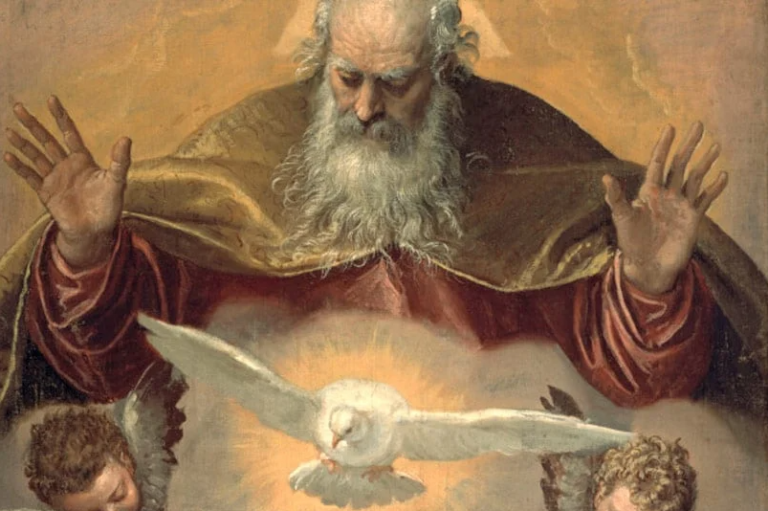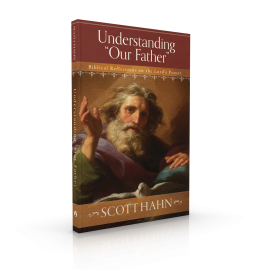By Scott Hahn
Scott Hahn, Founder and President of the St. Paul Center, is author of over forty books. Understanding "Our Father": Biblical Reflections on the Lord's Prayer is one of his most popular works, going step by step through the powerful prayer we often take for granted.

If we want to be Christians, we have no choice but to pray, “Our Father.” When the first disciples asked Jesus to teach them to pray, He taught them using those very words. To pray as a Christian means to pray, “Our Father.”
Yet, as I learned in my first days of ministry, the word father has become a stumbling block for some people. Divorce is common, as is birth outside wedlock. I live in a country that one popular book described as fatherless America. So, for a growing number of people, father has never meant provider, teacher, or guardian. It has meant only an aching absence—or an abusive presence.
Moreover, even children who have grown up with a good father are all too aware of his defects, problems, and sins. The best intentions of the most virtuous dads too often get botched in execution. What we human fathers wouldn’t give our kids! But we don’t always have what they want or need; and, when we do have it, we don’t know how to give it to them without spoiling them.
This is why Tradition tells us we must go beyond our earthly experiences and memories of fatherhood when we pray, “Our Father.” For though He is a provider, begetter, and protector, God is more unlike than like any human father, patriarch, or paternal figure. The Catechism puts it this way: “God our Father transcends the categories of the created world. To impose our own ideas in this area ‘upon him’ would be to fabricate idols to adore or pull down. To pray to the Father is to enter into his mystery as he is and as the Son has revealed him to us” (CCC 2779).
How has Jesus, God the Son, revealed the Father to us? As “[o]ur Father who art in heaven” (Matt 6:9). By adding that prepositional phrase “in heaven,” Jesus emphasizes the difference in God’s fatherhood. The Father to Whom we pray is not an earthly father. He is “above” us; He is the One we profess in the creed as “Father Almighty”—that is, all powerful. Though we are weak, limited, and prone to mistakes, nothing is impossible for God (Luke 1:37).
God’s power, then, sets His fatherhood apart from any fatherhood we have known or imagined. His “fatherhood and power shed light on one another” (CCC 270). Unlike earthly fathers, He always has the best intentions for His children, and He always has the ability to carry them out. Jesus wanted us to know this, so that we could always approach our heavenly Father with childlike trust and confidence: “[W]hatever you ask in prayer, you will receive, if you have faith” (Matt 21:22).
The Catechism teaches that “God reveals his fatherly omnipotence by the way he takes care of our needs” (CCC 270). We know God as Father because, over a lifetime of prayer, we experience His care for us. We come to see for ourselves that He is mighty, and that He will deny us nothing that is good for us.
Earthly fatherhood sometimes reflects these characteristics, as do those offices that assume fatherly roles in society: the priesthood, for example, and the government. Yet earthly fathers can perfect their fatherhood only by purifying themselves of earthly motives—such as greed, envy, pride, and the desire to control. They can become true fathers only by conforming themselves to the image of their heavenly Father, and that Image is His firstborn Son, Jesus Christ.
In governing, in parenting, or in priesthood, we come to exercise a more perfect fatherly role as we “grow up” in the Family of God: “[W]e are children of God, and if children, then heirs, heirs of God and fellow heirs with Christ” (Rom 8:16-17). This process is a divine corrective to the world’s distorted notions of patriarchy and hierarchy.
An ancient Christian writer, Dionysius the Areopagite, described hierarchy as something that originates in heaven, where divine light passes through the angels and the saints as if all were transparent. God’s gifts, then, are passed from one person to the next, undiluted. Those who are closest to God—and so higher in the hierarchy—serve those who are lower. At each stage, they give as God gives, keeping nothing to themselves.
Notice, here, how spiritual goods differ from material goods. If I have sole ownership of something—say, a sport coat or a tie—someone else can’t own it and use it at the same time. The higher goods, however, are spiritual; and spiritual goods—such as faith, hope, love, liturgy, the merits of the saints—can be shared and owned completely by all. That’s how the hierarchy works with the angels and saints in heaven.
For this sharing to take place “on earth as it is in heaven” requires the perfection of earthly fatherhood, which can take place only if we earnestly pray, “Our Father who art in heaven.” God is the primordial Father, “of whom all paternity in heaven and earth is named” (Eph 3:15, Douay Rheims Version). He is the eternal model by which all human fathers must be measured.
Down through the ages, skeptics have asked whether praying to “Our Father . . . in heaven” is consistent with our belief that “God is everywhere” and that He dwells within us (John 14:16, 23).
Yes, God is everywhere, on earth as He is in heaven. He is always present with us, and He lives within us when we are in the state of grace, free of mortal sin. Yet Jesus teaches us to pray to “Our Father . . . in heaven” because He wants us to lift our sights from our earthly exile to our true home—in heaven. Saint John Chrysostom said it well: Jesus taught us to pray this way not in order to “limit God to the heavens,” but rather to lift us up from earth and set us “in the high places and in the dwellings above.”
God made us for Himself; He made us for heaven. Heaven is separated from us not by light-years of space, but by our sins. Yet God Himself created our place of exile, and it’s a good place. Thus, it’s easy for us to get comfortable in our earthly lives and to forget our eternal destiny. Think of the Israelites wandering in the wilderness; after a few years of hardship, they grew nostalgic for their years of slavery in Egypt, where at least their bellies were full.
We, too, can think that way. When earthly troubles close in on us, heaven’s promises seem unreal and remote. When we fix our gaze on the near horizon, envious thoughts, resentments, and greedy impulses seem to make sense to us. After all, if we follow their enticing logic, maybe we can grab hold of the things we want right now.
The remedy to this, of course, is to set our sights on high, to heaven, our promised home. By God’s mercy and power—by His fatherhood!—He has promised us great things. Now we live in a state of grace, but then, when we are with “Our Father . . . in heaven,” we will live in a state of glory. Now we are His temples; but then He will be our Temple (Rev 21:22). Now, He lives in us; but then, we will live in Him.
Though we’re not home yet, God the Father is with us, and He has the power to lead us through the desert and across the Jordan. Though we have a long journey ahead, He is always in our midst.
You Might Also Like

In Understanding “Our Father”: Biblical Reflections on the Lord’ s Prayer, Scott Hahn presents a unique meditation on this common prayer, leading readers to consider the wealth of meaning in its seeming simplicity.